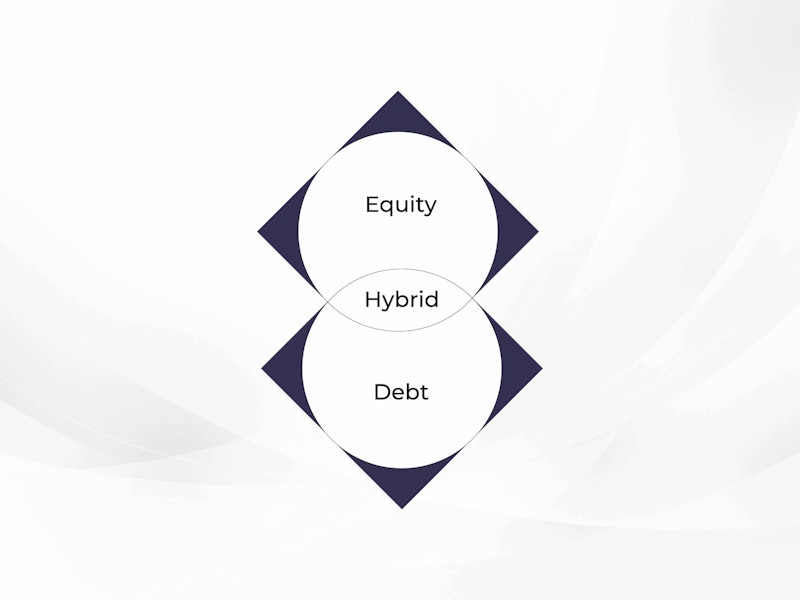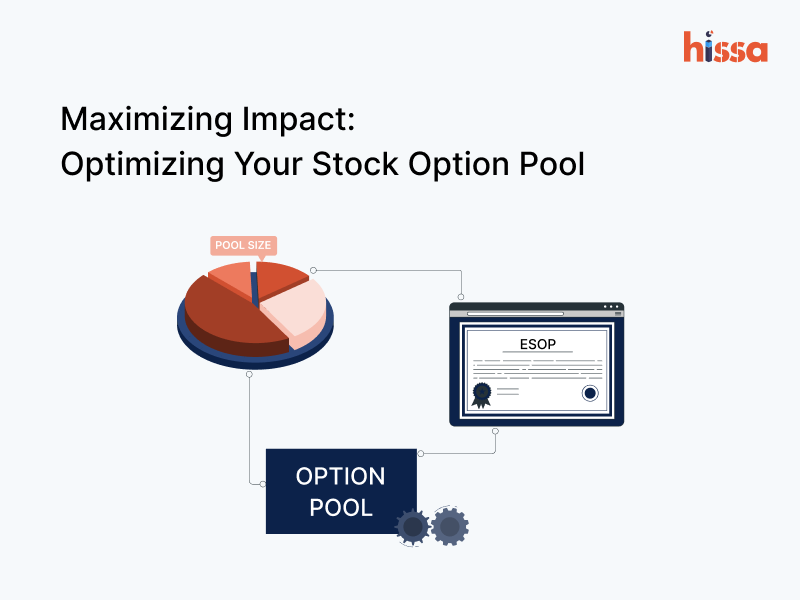A fundamental question that perhaps every entrepreneur asks themselves is what type of security suits best to raise capital for the company – debt or equity. In this series on ‘Securities’, we try to analyse this, by comparing the costs and benefits of raising money through debt and through equity, from the perspectives of both start-up companies and investors.
Since the type of security impacts the shareholding pattern of the company, it is important that due consideration is taken and the security terms are negotiated as part of the investment deal.
What are the common factors companies must consider when deciding the security for the round?
- Purpose of financing
- Type of investors
- Risk and return
- Growth stage of company
- Financial health of company
- Type of round – seed round, Series A, B, etc.,
- Priced or non-priced round
What are the different types of financing available to companies?
Debt and equity are two primary modes of financing available, and securities typically fall into either category. But over the years, companies have started issuing hybrid securities that have the components of both debt and equity.
Let us look at each financing form more in detail below:
1. Equity financing
Equity financing is when companies raise funds by issuing equity shares in return for capital. Equity shares are units of share capital that provide ownership and voting rights to its holders. Equity shareholders are also entitled to receive a share in the profits of the company, as dividend. Issuing equity to a third party against funds received means that current shareholders in a company lose some of their ownership (their stake is diluted).
Equity shares can be of two types: common equity or shares with differential voting rights.
- Common Equity Shares entitle their holders to cast one vote for every share held or in proportion to their share in the paid-up capital. Common shareholders are at the very bottom of the investor chain and receive dividends or return of capital only after all other shareholders have been paid.
- Shares with differential voting rights provide their holders the right to receive dividend or exercise votes, which places them above or below ordinary shareholders. However, such shares can be issued only if the articles of association of the company permit.
One of the most important sources for equity financing these days is private equity. Companies approach a seed investor, angel investor, or a venture capitalist for this. One key advantage of equity financing is that the company is under no pressure to return the capital to its equity shareholders.

2. Debt Financing
Here, companies borrow funds, and debentures are issued to acknowledge the debt received. Since creditworthiness is the fundamental criterion for giving a loan, only companies with good financial performance can afford debt financing.
Debtor companies must repay the principal amount loaned, along with interest, after a fixed duration. Holders of debentures are creditors of the company and are given priority at the time of its liquidation. Investors prefer debentures since it guarantees a return of their investment and is more secure than equity. Debentures also allow the company to raise long-term capital by either completely avoiding or postponing dilution.
Non-Convertible Debentures (NCD) and Redeemable Preference Shares (RPS) are different types of debentures.
- NCD are debt instruments that do not carry an option to convert to equity. A company can issue NCD if it wants to raise capital without issuing equity, thus altogether avoiding dilution in the shareholding of existing shareholders. NCD are issued with an option for redemption after a given period. For the investor, holding an NCD assures regular flow of interest and return of capital.
- RPS are issued when a company plans to redeem shares and return the money. This also occurs without diluting ownership, and without giving away any voting rights either. Only profits or capital reserves can be used to redeem these shares. Therefore, typically companies with strong balance sheets raise money through RPS.
3. Hybrid Financing
When companies raise funds in exchange for securities that have the features of both debt and equity, it’s called hybrid financing. In the recent past, most investors, even angels, have sought preference shares for their investments, because preference shareholders are placed ahead, over equity shareholders, in the line to receive liquidation proceeds, thus protecting their capital.
Some hybrid instruments are listed below:
• Compulsorily convertible preference shares (CCPS) provide investors the benefit of debt along with the economic risk of equity. CCPS will convert to equity, but in future, at a predetermined time or on the request of the shareholder or if the conversion is linked to a future event. Such an event could be a future round of financing or agreed performance metrics.
There are significant differences in the voting rights available to equity and preference shareholders. Equity shareholders can vote on all matters that come up in the company’s shareholders’ meetings. Preference shareholders, on the other hand, can vote only on matters that directly influence their rights. This mainly includes matters relating to winding up of the company or reduction of its capital.
• Compulsory convertible debentures (CCD) convert to equity after a given period. Holders of CCDs receive interest on the debt component of the instrument, with the added advantage of receiving equity on conversion. Interest is paid quarterly, half yearly, or yearly, as per the terms of the investment agreement. Since CCD are hybrid securities that convert to equity in the future, their holders will be included in the company’s cap table only when they actually convert.
• Optionally convertible preference shares (OCPS) give flexibility to holders to either redeem the shares or convert them to equity. Typically, redemption or conversion is linked to a certain date or event. Companies elect to raise funds through OCPS to retain the flexibility to redeem shares and return funds, thus avoiding dilution of ownership for existing shareholders. Investors like to keep the option to convert to equity, and benefit from the increase in valuation of the company over the period of OCPS.
• Optionally convertible debentures (OCD) come with an option for their holders to either redeem the money or convert to equity after a given period at a predetermined price. They include an interest component, payable until the maturity date. Investors choose OCD when they want flexibility to either be issued equity in the company or want guaranteed return of their capital.
• Convertible notes are issued when the company wants to raise an interim round of financing to meet its requirements until a full-fledged round can be raised. Usually, notes convert to equity based on a trigger factor. This could be a future round of financing, operation metrics, pure passage of time, or at the discretion of the company.
• Warrants give financial investors the right to convert their investment to equity within a given time in the future. If warrants are issued in combination with a convertible note, the warrants convert under the same terms as those of the convertible note in the subsequent round of financing.
What works better for start-ups? And what do investors prefer?
Companies and investors look at their options from different lenses. Investors are more likely to consider, ‘What am I getting?’ whereas companies’ approach is to be mindful of ‘What am I giving up?’
While companies seek to reduce the cost of capital, investors aim to get the maximum returns on the funds they invest. So, how do companies and investors decide and negotiate the right kind of financing that’s beneficial to both?
What does debt and equity mean for companies?
• Debt : One of the biggest advantages of debt financing is that the company knows exactly how much money needs to be paid back and by when. This gives the company time to plan and prepare.
Debt is also great for a company’s cap table. Since no new shares are issued, there’s no dilution of ownership of existing shareholders. Additionally, debtors neither have voting rights, nor any say in the managerial affairs of the company. Debtors are not eligible to receive any share in the profits of the company either.
However, since debt comes with an expiration date and the borrowed money needs to be paid back with interest, for companies with limited cash flow, few assets, or uncertain revenues, such as start-ups, it’s a struggle to not only find lenders, but also meet repayment obligations, if they have managed to raise funds through debt.
This is why debt financing is more common in companies that have a strong inflow of revenue.
• Equity : The dividend payable to the equity shareholders is subject to tax and is a cost to the company, unlike debt, where interest on the loan is tax deductible.
But with equity financing, there is no obligation to return capital, especially if there’s no profit, and this becomes a key advantage for start-up companies in terms of keeping their costs low.
One of the most important sources for equity financing these days is private equity. Companies approach seed investors, angel investors, or venture capitalists who are willing to take risks. Since the earnings on equity is directly proportional to the growth in value of the company, private equity investors not only provide financial help but also mentor the company, providing networking facilities, access to customers, developing partnerships with others in the start-up ecosystem.
A major disadvantage though is dilution in shareholding. As more shares are issued to third party financial investors, existing shareholders do lose a portion of their stake, but this can be offset by choosing the right investors who contribute to the company’s growth, and add value to everyone’s shareholding.
Since equity shareholders have voting rights, companies have to seek their affirmative votes on several matters that are likely to affect business and operations, such as –
(i) mergers, demergers, amalgamations, consolidations;
(ii) acquisition of other businesses by way of purchase of shares, business transfer, asset purchase;
(iii) creation of joint ventures or partnerships, creation of a subsidiary;
(iv) any strategic, financial or other alliance with a third party which results in investments by the company;
(v) approval of any business plan or annual plan;
(vi) changes in terms relating to vesting of founders, and so on. Companies also have to regularly update the shareholders on various developments through shareholders’ meetings.
Venture capitalists may also seek a seat on the company’s board, in which case they also reserve the right to vote on various decisions concerning the company.
What investors get from debt and equity
Debt
Creditors earn interest on the loans they extend. If the debt is secured by an underlying asset of the debtor (company), then creditors’ risk is relatively low. This does not however mean that debt can’t turn bad. If the company has limited assets, which cannot be sold to pay off the amount borrowed, with interest, or the company loses a major revenue stream and cannot service the debt regularly, then creditors will be at a loss. Hence, investors avoid investing in debt securities (especially the non-convertible variety) of start-up companies that are yet to find their feet in the market.
equity
Equity paves the way for investors to become owners of the company. With equity ownership, they gain the right to receive dividends, cast votes on major decisions, and take part in the decision-making of the management. The shareholders also have the advantage of receiving bonus shares and additional shares during a rights issue.
A real disadvantage however is that equity shareholders are at the bottom of the capital chain, which means they run the risk of not receiving any return on their capital in a liquidation situation – in fact they may not even get their capital back. Of course, there’s also the possibility of dilution when the company raises funds in another equity round, if current shareholders decide not to invest additional money.
What are the common securities issued to non-resident investors by Indian private companies?
Foreign investors can invest in Indian companies subject to the provisions of the FDI policy. Unlike domestic investments, money coming from abroad is subject to a number of conditions under FEMA, as well as SEBI and RBI regulations, which the companies must satisfy.
Common securities issued to non-resident investors are:
Equity shares : Companies can issue fully or partly paid equity shares in exchange for foreign investments. However, the following conditions must be met:
- Partly paid shares must be fully paid within a period of 12 months,
- 25% of the total consideration must be paid upfront.
The holders of equity shares are entitled to receive dividends. The dividend payable on such shares are repatriable, i.e., dividends can be paid outside India.
Debentures : If companies wish to use a debt security to receive foreign funds, then the security must be linked to equity. Compulsorily convertible debentures (CCDs) are issued to fulfil this condition.
Preference shares : Only preference shares that are fully, compulsorily, and mandatorily convertible to equity in the future can be issued in exchange for foreign funds. An important point to keep in mind is that the price per share at the time of conversion cannot be below the issue price of each CCPS.
Share warrants : Warrants to foreign investors must be issued in accordance with SEBI’s regulations. Warrants can be partly paid – but at least 25% of the total investment must be paid upfront, with the balance payable within 18 months.
Convertible note: In 2017, the RBI amended FEMA regulations to allow recognised start-up companies to issue convertible notes to foreign investors also. A non-resident individual (NRI) can acquire convertible notes, so long as the proceeds from the sale of their investment are not taken out of India. If the startup company is engaged in a sector that requires prior approval from the Government to receive such a foreign investment, then the company must obtain approval before issuing the note. Few sectors covered under this route include broadcasting content services, print media, mining and minerals etc.
Further, a non-resident can convert the convertible note only to equity of the company. Start-ups can now issue convertible notes – but only if the amount of investment is INR 25 lakhs or more in a single tranche. A start-up company doing business in a sector where foreign investment requires government approval may issue convertible notes to a non-resident only with the approval of the government. The investment amount should be received by inward remittance through banking channels into specific bank accounts maintained by the person concerned.
All parameters for conversion must be decided when the notes are issued. At no time should the conversion price of shares be less than the fair value of the shares when issued.
All securities must be issued within 60 days from the date of receipt of consideration.
How is the price of securities issued to foreign investors decided?
The price of securities is decided on an arm’s-length basis. This means, a merchant banker, chartered accountant, or a cost accountant must arrive at the share price using internationally accepted pricing methodologies. At no time can the price of shares issued to the foreign investor be less than the price issued to resident investors.
Private limited companies whose shares are unlisted, venture equity and venture debt are the most common sources of funding. With the start-up ecosystem booming, there is no dearth of funds or investors. Therefore, companies must carefully model various financing rounds, and consider how different securities affect the cap table, before locking in on the security issued in each round.
As can be seen, both debt and equity financing come with pros and cons that affect both the company and the investors. Depending on the size of the company, amount of funds required, purpose of raising funds, current capitalisation structure of the company, company’s cash flow, business model, and other factors, the company management must take a call on what type of financing will work best for the company and its shareholders.







